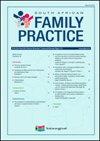滥用含有可待因的药品:合格药学专业人员的看法和行为
IF 1.2
Q2 MEDICINE, GENERAL & INTERNAL
引用次数: 0
摘要
背景:在社区药房工作的药剂专业人员经常提供药剂师发起的治疗,包括含可待因的药物。可待因是一种极易被滥用的阿片类药物,加重了全球阿片类药物流行的负担。专业药剂师是管理可待因使用的第一干预点。本研究强调了药学专业人员的观念和行为在抗击阿片类药物流行中的重要性:进行了一项描述性横断面研究。简单随机抽样包括约翰内斯堡大都市的药学专业人员。通过电子邮件分发了一份电子问卷,并对数据进行了描述性分析:调查结果表明,药剂师会例行询问患者可待因的使用情况(n = 48;53.9%),避免将非处方(OTC)可待因作为初始治疗配药(n = 61;69%),并表示有信心识别和管理可待因的滥用(n = 69;77.5%)。尽管如此,患者对非处方药可待因(n = 69; 77.5%)需求的增加还是令人担忧,他们强调了从互联网(n = 76; 85.4%)和多家药店(n = 84; 94.4%)购买可待因的便利性。患者对不良健康后果(66 人;74.2%)和可待因依赖风险(79 人;88.8%)缺乏认识,对此表示担忧:结论:社区药房中含可待因药品的供应和可及性日益受到关注。顾客不了解滥用和依赖可待因对健康造成的不良后果,药剂师提供的信息不力也是一个令人担忧的问题:本研究的结果有助于深入了解配药人员对滥用可待因药物这一日益严峻的挑战所持态度的影响。本文章由计算机程序翻译,如有差异,请以英文原文为准。
The misuse of codeine containing medicines: Perceptions and behaviours of qualified pharmacy professionals
Background: Pharmacy professionals working in community pharmacies frequently provide pharmacist-initiated therapy, including codeine-containing medicines. Codeine is an opioid with great potential for misuse, adding to the global opioid epidemic burden. Professional pharmacy personnel are the first intervention point in relation to management of codeine use. This study highlights the importance of pharmacy professionals’ perceptions and behaviours in combatting the opioid epidemic.Methods: A descriptive cross-sectional study was conducted. Simple random sampling included pharmacy professionals in the metropolitan city of Johannesburg. An electronic questionnaire was distributed via e-mail and data analysed descriptively.Results: Findings indicate that pharmacy personnel routinely ask patients about codeine use (n = 48; 53.9%), avoid dispensing over-the-counter (OTC) codeine as an initial treatment (n = 61; 69%) and express confidence to identify and manage codeine misuse (n = 69; 77.5%). Despite this, increased patient demands for OTC codeine (n = 69; 77.5%) were concerning, highlighting the ease of availability from internet sources (n = 76; 85.4%) and multiple pharmacies (n = 84; 94.4%). Apprehension about the lack of patient awareness on adverse health consequences (n = 66; 74.2%) and the risk of codeine dependence (n = 79; 88.8%) was expressed.Conclusion: Growing concern regarding availability and accessibility of codeine-containing medicines within the community pharmacy sector is highlighted. Adverse health consequences of codeine misuse and dependence are not understood by customers and the ineffective information provided by pharmacy personnel was highlighted as a concern.Contribution: The results of this study give insight to the influence of dispensing personnel’s attitude towards the growing challenges with respect to codeine containing medication abuse.
求助全文
通过发布文献求助,成功后即可免费获取论文全文。
去求助
来源期刊

South African Family Practice
MEDICINE, GENERAL & INTERNAL-
CiteScore
1.50
自引率
20.00%
发文量
79
审稿时长
25 weeks
期刊介绍:
South African Family Practice (SAFP) is a peer-reviewed scientific journal, which strives to provide primary care physicians and researchers with a broad range of scholarly work in the disciplines of Family Medicine, Primary Health Care, Rural Medicine, District Health and other related fields. SAFP publishes original research, clinical reviews, and pertinent commentary that advance the knowledge base of these disciplines. The content of SAFP is designed to reflect and support further development of the broad basis of these disciplines through original research and critical review of evidence in important clinical areas; as well as to provide practitioners with continuing professional development material.
 求助内容:
求助内容: 应助结果提醒方式:
应助结果提醒方式:


